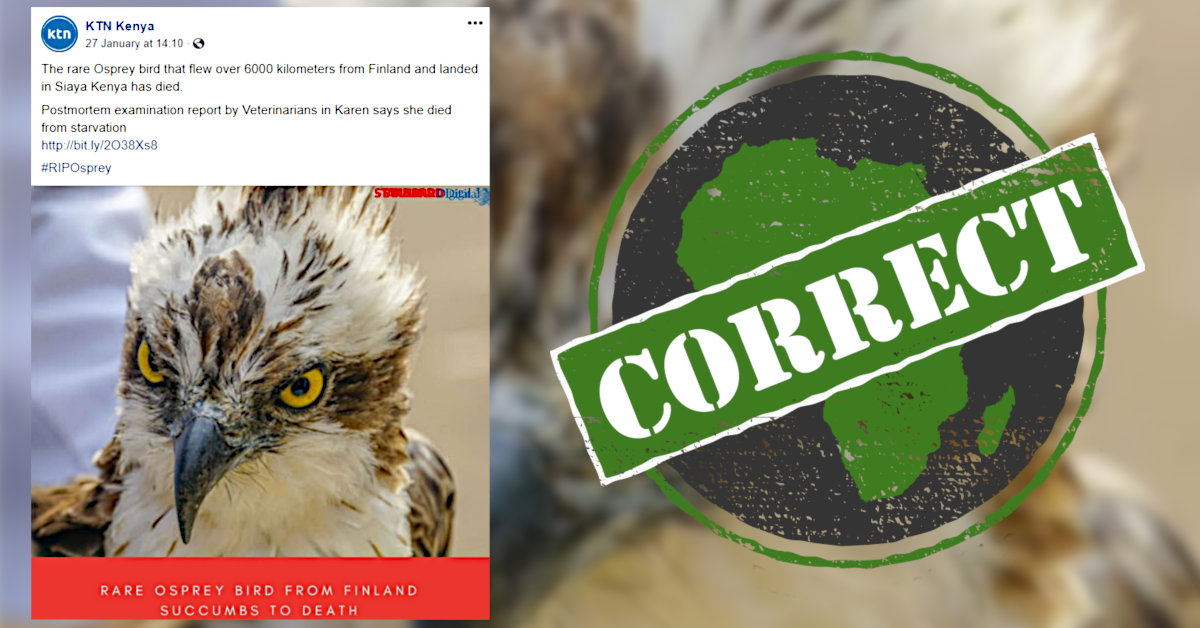On 24 January 2020 it was reported that a rare osprey, a wild bird also known as a fish hawk, had been caught in a fishing net after flying nearly 7,000 kilometres from Finland to western Kenya.
The bird was rescued and put in the care of the Kenya Wildlife Service (KWS).
Three days later a graphic posted on Facebook claimed the bird had died.
“Postmortem examination report by Veterinarians in Karen says she died from starvation,” the post says, adding: “#RIPOsprey”.
The post was flagged as possibly false by Facebook’s fact-checking system. Has the long-travelled osprey really died?

The post links to an article in the Standard, a Kenyan newspaper, headlined: “Migratory bird that had flown from Finland dies of starvation.” It says the starvation had “precipitated systemic organ failure”.
Earlier, the KWS had said in a statement that the bird was caught in Siaya county in the southwest of Kenya, and delivered to the KWS veterinary department on 23 January.
On 27 January, the KWS announced on Twitter that the bird had died.
“We regret to announce the death of the rescued migratory Osprey bird despite all efforts to rehabilitate and eventually release it back into the wild,” it said.
“The four-year-old bird of prey died at the weekend while under the care of Kenya Wildlife Service (KWS) veterinarians and a KWS-licensed Raptor Rehabilitation Centre in Karen, Nairobi.”
A ring around the bird’s leg showed it was from eastern Finland, nearly 7,000 kilometres from where it was found in Kenya.
In an earlier tweet, the KWS said they had contacted the Finnish bird experts who originally ringed the Osprey. They recommended that the bird be set free by March 2020.
Unfortunately, the bird died before it could be released. – Dancan Bwire
The bird was rescued and put in the care of the Kenya Wildlife Service (KWS).
Three days later a graphic posted on Facebook claimed the bird had died.
“Postmortem examination report by Veterinarians in Karen says she died from starvation,” the post says, adding: “#RIPOsprey”.
The post was flagged as possibly false by Facebook’s fact-checking system. Has the long-travelled osprey really died?

‘Despite all efforts to rehabilitate’
The post links to an article in the Standard, a Kenyan newspaper, headlined: “Migratory bird that had flown from Finland dies of starvation.” It says the starvation had “precipitated systemic organ failure”.
Earlier, the KWS had said in a statement that the bird was caught in Siaya county in the southwest of Kenya, and delivered to the KWS veterinary department on 23 January.
On 27 January, the KWS announced on Twitter that the bird had died.
“We regret to announce the death of the rescued migratory Osprey bird despite all efforts to rehabilitate and eventually release it back into the wild,” it said.
“The four-year-old bird of prey died at the weekend while under the care of Kenya Wildlife Service (KWS) veterinarians and a KWS-licensed Raptor Rehabilitation Centre in Karen, Nairobi.”
Bird ringed in eastern Finland
A ring around the bird’s leg showed it was from eastern Finland, nearly 7,000 kilometres from where it was found in Kenya.
In an earlier tweet, the KWS said they had contacted the Finnish bird experts who originally ringed the Osprey. They recommended that the bird be set free by March 2020.
Unfortunately, the bird died before it could be released. – Dancan Bwire
Republish our content for free
For publishers: what to do if your post is rated false
A fact-checker has rated your Facebook or Instagram post as “false”, “altered”, “partly false” or “missing context”. This could have serious consequences. What do you do?
Click on our guide for the steps you should follow.
Publishers guideAfrica Check teams up with Facebook
Africa Check is a partner in Meta's third-party fact-checking programme to help stop the spread of false information on social media.
The content we rate as “false” will be downgraded on Facebook and Instagram. This means fewer people will see it.
You can also help identify false information on Facebook. This guide explains how.


Add new comment